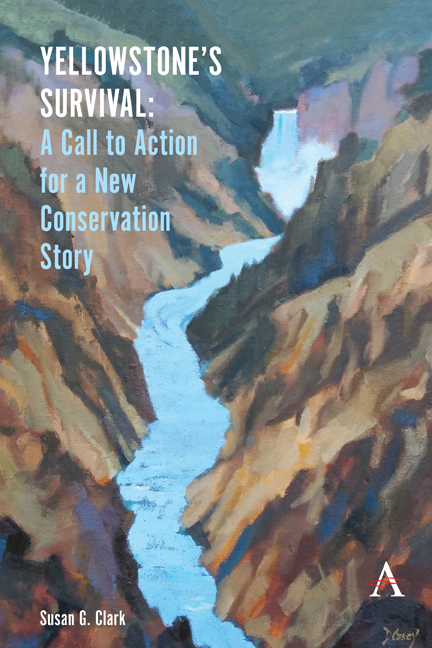 Yellowstone's Survival - A Call to Action for a New Conservation Story
Yellowstone's Survival - A Call to Action for a New Conservation Story Published online by Cambridge University Press: 22 May 2021
Part 3 offers strategic, yet practical options to address GYE's multifaceted problems. It builds on and extends all preceding sections. It draws on my half-century's experience in the ecosystem, working in other ecosystems in North American and on other continents, and from broad research, teaching, and fieldwork worldwide.
This part encourages greater foresight and the development of new knowledge, skills, and enhanced self-awareness to best address GYE's problems. The options and examples offered provide a practical way to transition to better thinking and actions that lead to enhanced conservation. As I see it, we must culturally create a new conservation story that offers a sustainable way for nature and people to coexist— a new GYE conservation paradigm that becomes widely accepted and lived on the ground. It must be sufficiently realistic to provide pragmatic steps, actions, and process to make a difference.
In Part 3— on challenges, learning, and the work ahead— I offer options for greater effectiveness in conservation on the ground through cooperative arrangements and upgraded management policy. In Chapter 8 on “Challenges and Future,” I revisit promises we made to ourselves about the special place we call GYE today. This chapter offers a series of actionable problem definitions and alternatives to address existing problems. If used, these can be transformative. What we do on the ground is the only place that really matters.
Chapter 9 on “Learning and Transforming” highlights the need to upgrade our ability to orient realistically to shared, widespread problems, to colearn a way to address them, and to transform our thinking and behavior to make a real difference. To be successful, we will need high-order leadership and new everyday skills for enhanced problem solving. This chapter offers practice-based, on-the-ground options.
Chapter 10 on “The Work Ahead” suggests a new cultural (institutional) story of meaning for GYE and ourselves in it. All of us need to see GYE as a whole, with ourselves as part of that holistic, evolving system. The sharp distinction between people and nature is outdated. The future of GYE depends on whether we choose to come to an integrated conservation story and appropriate follow-on actions or not. The new story or paradigm is slowly emerging in some circles in the regional society and well beyond.
To save this book to your Kindle, first ensure no-reply@cambridge.org is added to your Approved Personal Document E-mail List under your Personal Document Settings on the Manage Your Content and Devices page of your Amazon account. Then enter the ‘name’ part of your Kindle email address below. Find out more about saving to your Kindle.
Note you can select to save to either the @free.kindle.com or @kindle.com variations. ‘@free.kindle.com’ emails are free but can only be saved to your device when it is connected to wi-fi. ‘@kindle.com’ emails can be delivered even when you are not connected to wi-fi, but note that service fees apply.
Find out more about the Kindle Personal Document Service.
To save content items to your account, please confirm that you agree to abide by our usage policies. If this is the first time you use this feature, you will be asked to authorise Cambridge Core to connect with your account. Find out more about saving content to Dropbox.
To save content items to your account, please confirm that you agree to abide by our usage policies. If this is the first time you use this feature, you will be asked to authorise Cambridge Core to connect with your account. Find out more about saving content to Google Drive.